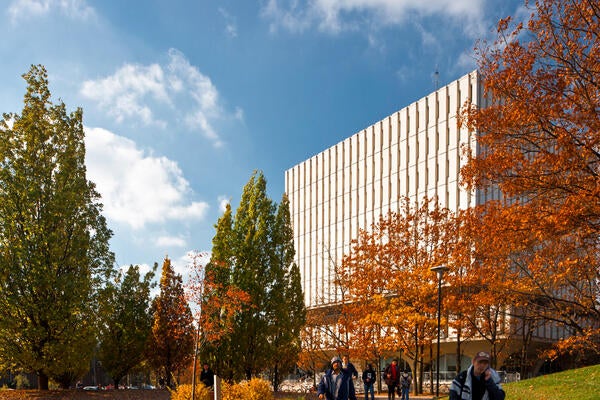
International Women’s Day: A time to reflect on women in science
Gender equity and diversity in science and technology promote excellence in research, says Waterloo philosophy prof.

Gender equity and diversity in science and technology promote excellence in research, says Waterloo philosophy prof.
By Wendy Philpott Faculty of ArtsBetter research happens when more women work in disciplines like science and technology, says philosophy professor Carla Fehr.
 “Research communities that are diverse and run on democratic principles simply do better science,” says Fehr, who holds the Wolfe Chair in Science and Technology Studies in the Department of Philosophy, a position mandated to build scientific and technological literacy across the disciplines.
“Research communities that are diverse and run on democratic principles simply do better science,” says Fehr, who holds the Wolfe Chair in Science and Technology Studies in the Department of Philosophy, a position mandated to build scientific and technological literacy across the disciplines.
Fehr’s scholarship and outreach activities are driven by a desire to improve gender equity and diversity in research communities. As a philosophy professor dedicated to advancing women in scientific fields, Fehr works at the critical intersection where humanities meet science and technology.
Drawing on her expertise in science, feminism and philosophical inquiry, Fehr examines the structures and social relationships of scientific communities. In particular, she explores how gender equity within such communities can improve overall research quality.
“Diversity in scientific communities also helps ensure the work meets the broader needs of society and public welfare” says Fehr.
Last week, Fehr gave a public lecture on “What Evolution Can’t Tell us About Women’s Sex and Women’s Work.” For International Women’s Day on March 8, Fehr has co-organized an interdisciplinary conference at the Perimeter Institute in Waterloo called, “Women in Physics: Past, Present, and Future.”
“The steps we take to improve the representation of women and members of underrepresented groups in the academy also help the university recruit excellent researchers and improves job satisfaction for everyone, women and men,” says Fehr.
Of course “diversity” is not only about gender and social groups but also about multiple disciplines working for a common goal. “So many of our major problems, such as climate change, require people from a wide range of perspectives to come together to address the problem,” she says.
As for the role of her home discipline, she states that given science fields are becoming more and more specialized, there is even more need for rigorous critical thinking about the assumptions made in the name of scientific progress, “I think philosophy provides that.”

Read more
Meet five exceptional Waterloo graduate students crossing the convocation stage as Class of 2025 valedictorians

Read more
The Royal Society of Canada welcomes five new fellows and one RSC College member from the University of Waterloo

Read more
The Government of Canada announces funding to support research in health, AI, climate and social equity and drive national innovation
The University of Waterloo acknowledges that much of our work takes place on the traditional territory of the Neutral, Anishinaabeg, and Haudenosaunee peoples. Our main campus is situated on the Haldimand Tract, the land granted to the Six Nations that includes six miles on each side of the Grand River. Our active work toward reconciliation takes place across our campuses through research, learning, teaching, and community building, and is co-ordinated within the Office of Indigenous Relations.